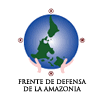Chevron Spokesman James Craig Blasted by Rainforest Leaders for Meddling In Historic Environmental Trial
Complaints to Be Filed In Ecuador and United States

Amazon Defense Coalition
9 March 2009 - FOR IMMEDIATE RELEASE
Contact: Karen Hinton at +1.703.798.3109
Quito, Ecuador - Amazonian leaders today blasted James Craig, an American public relations official with Chevron affiliated with the J. Walter Thompson advertising agency, for undermining a long-running environmental trial in Ecuador where the oil giant faces a $27 billion liability for dumping toxic waste into the rainforest.
"Chevron is using James Craig as a hit man to sabotage a trial in Ecuador because it expects to lose and be on the hook for billions of dollars," said Luis Yanza, a representative for the dozens of communities and indigenous groups that brought the lawsuit.
"James Craig's behavior is unethical and shows a profound disregard for the law," added Yanza, a recent winner of the Goldman Environmental Award, considered the "Nobel" prize of the environmental movement.
Yanza said his group, the Amazon Defense Coalition, would file a complaint against Chevron and Craig before the Better Business Bureau and applicable professional associations in the U.S. and Ecuador. The lawsuit accuses Texaco (now Chevron) of dumping more than 18 billion gallons of toxic waste into Amazon waterways, leading to an outbreak of cancer and other oil-related health problems.
Texaco, bought by Chevron in 2001, was the exclusive operator of large oil concession in Ecuador's rainforest from 1964 to 1990. In addition to the dumping, the company abandoned more than 900 toxic waste pits gouged out of the jungle floor which are still leaching toxic sludge into soils, streams and groundwater, according to scientific evidence in the case.
A former reporter, Craig was hired several months ago by Chevron's legal department as a spokesman after it became clear that the company's Ecuadorian counsel was refusing to defend Chevron in the press. Craig recently purchased several large advertisements in a leading Ecuadorian newspaper accusing the trial court of "fraud" for proceeding with the lawsuit, despite the fact Chevron had previously asked a U.S. federal judge to transfer the case to Ecuador by arguing its courts were fair and adequate.
The advertisements attack the Ecuadorian judge, the court-appointed scientific expert who conducted the damages assessment, and lawyers for the plaintiffs. They appeared under Craig's name in El Comercio, considered the leading newspaper in Ecuador, and were paid for by Norlop Thompson, a local affiliate of J. Walter Thompson (known as JWT). Chevron's logo is at the top of the advertisements.
Steven Donziger, an American legal advisor to the plaintiffs, said Craig bought the advertising as part of Chevron's campaign to intimidate the court and "smear" the reputation of the court-appointed expert who supervised the damages assessment. Buying advertisements to influence the outcome of a trial or to intimidate court personnel is prohibited in the U.S. and might subject lawyers to court sanctions, Donziger said.
The court expert targeted by the advertisements, Professor Richard Cabrera, was used by Chevron as an expert in a previous phase of the case. Only when the judge later appointed Cabrera to determine damages did Chevron find him unacceptable because it signaled the trial would soon end, said Donziger.
"Chevron is not accustomed to losing lawsuits to the world's downtrodden so they are adopting increasingly desperate litigation tactics that never would be allowed in a U.S. court," said Donziger. "This is a modern-day version of Texaco's decades-long pattern in Ecuador of deceiving indigenous groups and abusing the court system."
"Craig's job is to steamroll the court but it is backfiring because it looks so transparently foolish," added Donziger.
Donziger said Craig's strategy should be known by Chevron shareholders because it is intended to hide a significant financial liability. Two Chevron lawyers and seven former government officials are under criminal indictment in Ecuador for lying about the results of a purported clean-up, a fact the company has not disclosed in its public filings.
Although the environmental case was first filed in U.S. federal court in New York in 1993, Chevron was able to transfer the case to Ecuador in 2002 by submitting ten expert affidavits praising the courts there as fair. Once the evidence in the Ecuador trial started to point to Chevron's culpability, the oil giant began to attack the trial process as unfair.
According to the court expert, all 94 of Chevron's former production sites in Ecuador are extensively contaminated with toxins, including carcinogens such as Chromium IV. Most of the scientific evidence he relied on was provided by Chevron.
Craig is not the only Chevron consultant to come under fire recently. Douglas Southgate, a professor at Ohio State University hired by Chevron to defend its actions in Ecuador, is affiliated with a think tank that denies global warming is linked to human activity. One of Chevron's leading scientific advisors on the case is Ralph Marquez, a former lobbyist for the chemical industry in Texas.
"Chevron is trying to undermine the ability of rainforest residents to exercise their legal rights," said Yanza. "It's sad to see a well-known American oil company behave this way when America as a country seems to be moving in a new direction."